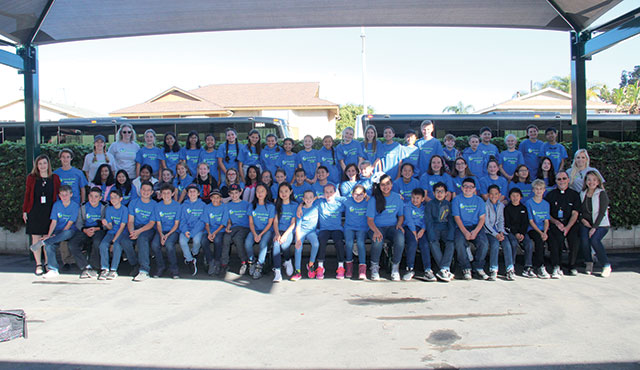Three hundred and sixty eight students from eleven Catholic elementary schools are participating on Emerald Cove Outdoor Science Institute (ECOS Institute) in Running Springs, CA. Students come from St. Bonaventure School (Huntington Beach), Our Lady Queen of Angels School (Newport Beach), St. Barbara School (Santa Ana), St. John the Baptist School (Costa Mesa), St. Pius V School (Buena Park), St. Irenaeus School (Cypress), Blessed Sacrament School (Westminster), Our Lady of Fatima Academy (San Clemente), St. Catherine of Siena School (Laguna Beach), St. Francis of Assisi School (Yorba Linda), and Sts. Simon and Jude School (Huntington Beach).
A camp experience allows students to explore the environment, grow in peer relationships, leadership, self-esteem, and leadership. Students learn responsibility and cooperation through group living, and practicing courtesy and table manners at meals, are some of the ways students develop their social skills. Students hike established trails, investigate geological features, observe wildlife and compare plant adaptations. During the evenings, students study the night sky through telescopes and use their senses to experience the forest at night.
“I love this program because it puts into the life real applications of the Next Generation Science Standards. The ideas taught at science camp translate into the classroom. Currently the 6th graders are learning about animal and plant cells. They just finished a project where they could present their mastery of the subject in many ways. Many chose to make cakes into cells,” said Sarah Barry, Science teacher at St. Bonaventure School in Huntington Beach.
Students investigate the connection between living and non-living elements of the forest ecosystem. They examine changes in biotic and abiotic factors, and draw conclusions about natural relationships between plants and their surroundings. Students also learn how to use a dichotomous key to identify local trees and shrubs, including pines and cedars more than 300 years old.
Staying in the mountains at an elevation of 6,500 feet for four or five days give students the opportunity to develop an awareness and appreciation of their environment. Students limit their impact on trails, respect wildlife, take short showers and recycle. They go home knowing more about the natural world and themselves. “I learned I am capable to be away from home and can overcome challenges,” said a student participant.
Equipped with goggles, rock hammers, and field microscopes, students observe the geologic characteristics of the mountains. Students learn to understand the process of weathering, erosion, and soil production by their walk down the Geology Trail. Additionally, students experiment with prospecting, using gold pans at the creek.
“We informally call it ‘Catholic Weeks’ at ECOS in which students from Catholic schools come together for the camp. It’s been a tradition and students are excellent, academically and behavior wise,” said Pam Johnson, director of educational partnership at ECOS Institute.
As students explore and understand science and nature, they develop interests and learn about possible careers for the future.

